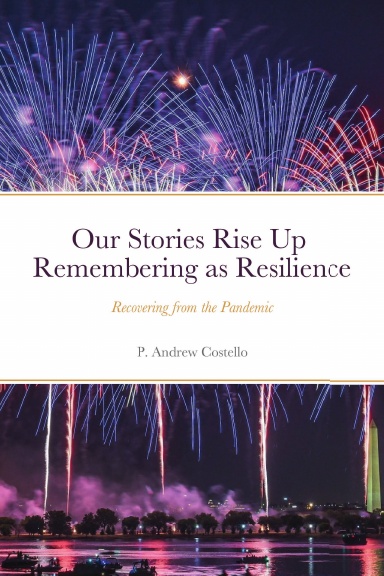P. Andrew Costello
Our Stories Rise Up Remembering as Resilience“Recovering from the Pandemic”
Preface
This book that you have in your hands, or you are reading on a screen took two years and twenty years to write. In its immediacy, it emerged in these last two years of trying to make sense of the pandemic and what it was doing to our lives. But its gestation began 20 years back with the Storywise team who have been developing a whole new approach to stories through the use of maps and design thinking.
Stories draw us deep inside. Maps bring us back outside. One helps us internalize experiences even if they are not our own. The other helps externalize these ideas or feelings, so we can stand back and see what is moving where, and how the parts might cohere into a larger whole.


This book is a combination of these two movements. At first, we examine the pandemic experience using testimonies to remind us of the courage that the crisis drew out of so many people. At other times, we will offer you maps to locate where this experience fits into a larger pattern of life and meaning-making. “Where you are,” we argue, is the vital question. Navigation is the vital skill.
We are going to claim that memory is made from what is most meaningful, and that it is inherently biased towards healing and reconciling. Though there is much talk about trauma and recovery, this book is offered as one resource that might help people step back into the full flow of life.
As writers know, you write immersed in the unfolding, and only at the end realize what it is you have composed, because only then you have a map. What we did not realize till the end was that we had written two short books, not one.
This book is a combination of these two movements. At first, we examine the pandemic experience using testimonies to remind us of the courage that the crisis drew out of so many people. At other times, we will offer you maps to locate where this experience fits into a larger pattern of life and meaning-making. “Where you are,” we argue, is the vital question. Navigation is the vital skill.
We are going to claim that memory is made from what is most meaningful, and that it is inherently biased towards healing and reconciling. Though there is much talk about trauma and recovery, this book is offered as one resource that might help people step back into the full flow of life.
As writers know, you write immersed in the unfolding, and only at the end realize what it is you have composed, because only then you have a map. What we did not realize till the end was that we had written two short books, not one.

We would be naive to think of memory as innocent. Some leaders use it as a weapon of hatred and division. We propose memory as a powerful healing and unifying resource, but we need to learn how to make better memories and how to use them.

That leads to the second book which is written more as a practical guide with lots of ideas of practices that will help us forge better memories, not only of the pandemic but of any significant life experiences that we think are worth preserving. The original audience for the book is parents, teachers and AmeriCorps members, but we hope it can speak to anyone who has lived through these last few years and is now looking for ways to move beyond it. Welcome to Our Stories Rise Up. We wish you an edifying journey.